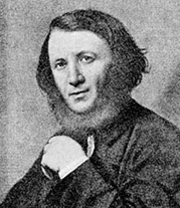On this date in 1812, Robert Browning was born in London. The precocious child began writing poetry at age 12, attended London University College for a year at age 16 and eventually established his reputation as a major poet by 1845. One of his most famous writings is “The Pied Piper of Hamelin.” Although Browning’s mother was a devout evangelical, Robert announced at age 13 after reading “Queen Mab” by Shelley that he was (at least briefly) an atheist.
At a more mature age, Browning began reevaluating religion once more during his friendship with W.J. Fox, the former Unitarian minister at London’s famous South Place Chapel. “Who knows most, doubts most,” Browning wrote (cited in 2000 Years of Disbelief by James A. Haught).
Browning’s famous correspondence and whirlwind romance with poet Elizabeth Barrett resulted in their marriage in 1846. They settled in Italy for the benefit of Elizabeth, an invalid. They had a son, Robert (“Pen”) Jr., in 1849. At the death of his wife in 1861, Browning was said to have discarded any remaining Christian beliefs, although the degree of his skepticism is debated by academics. In The Ring and the Book, iv., Browning wrote: “Mothers, wives, and maids — There be the tools wherewith priests manage men.” (D. 1889)


